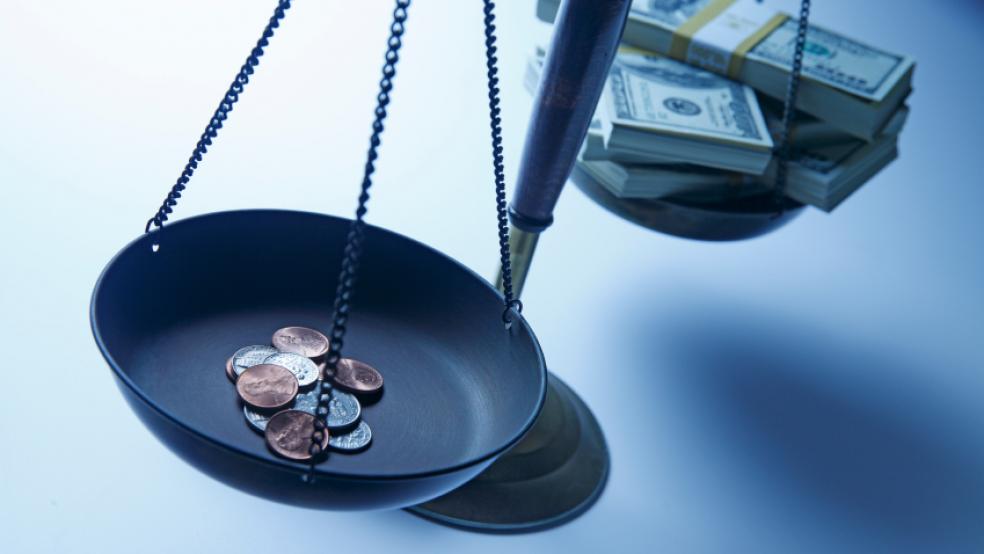If the policies favored by some Republicans seeking the nomination for president turned into reality, we’d roll back or eliminate our social insurance programs, cut taxes on the wealthy, cut spending even more to slash the deficit, and turn health care over to the private sector.
The “you’re on your own no matter what bad luck comes your way” society is a desirable outcome according to this view because it creates the correct incentives for people to be gainfully employed and take care of themselves. Never mind that history shows many people won’t prepare for retirement, purchase health care, set aside funds in case of job loss, and so on unless they are forced to do so by government programs, and will thus then end up being an even bigger burden to the rest of society, Those who support these policies appear to believe that this time will somehow be different.
What do these issues have in common?
Related: Hillary, Bill Clinton Report Total Income of $140 Million Since 2007
At first glance, it seems as though the crusade against programs that benefit the poor and the middle class are driven by the political power of the wealthy. Many of the wealthy and powerful that support Republican candidates object to being forced to support the “undeserving” through taxation and redistribution. The calls to cut government spending to avoid disastrous, though largely imagined consequences, and the push to cut taxes to avoid harmful economic distortions that supposedly lower economic growth are, in the end, about the desire to reclaim income lost to taxes.
Sure, there are Republicans who truly believe that these programs are harmful, but there are also a large number of Republicans who do not want to share with the less fortunate through income redistribution programs that support social insurance.
The idea that this is all about selfishness, power, and influence leaves open the question of why so many people who are not among the rich and powerful support these policies. And how does the fierce opposition to immigration fit into the political power story? Does immigration somehow threaten the interests of the wealthy?
Related: The Politics of Economics and ‘Very Serious People’
There is no doubt that political power is an important part of the story, but there is a deeper connection among all of these issues. Inequality. The incomes of working class households have been stagnant for decades while those at the top have soared. These households struggle to pay the bills each month, to send their kids to college, and provide the healthcare their families need. They sense rising economic insecurity due to globalization, digital technology, and the constant chatter about robots taking their jobs. Something has gone wrong. Their children are supposed to do better than they did, incomes are supposed to rise over time as we become more productive, but that isn’t happening. They want someone to blame.
For some, the natural tendency is to blame others for their problems. They turn to explanations, rightly or more often wrongly, such as immigrants are taking jobs, lowering wages, and placing a burden on social insurance programs. The undeserving, able-bodied, lazy poor get help from the government for all sorts of things – education, healthcare, and so on – that they struggle to provide for their families. And to add insult to injury, they are forced to help pay for this assistance.
Presidential nominees from both political parties are attempting to tap into the sentiment that the country is headed in the wrong direction, and those who blame the “others” for their problems are receptive to the Republican message. Republicans will close the borders, slash spending that requires the redistribution of income to the undeserving, and when all is said and done the belief is that there will be more income and opportunity available to hard-working, upstanding, moral households. Households like theirs. I think they are wrong about that. There is less redistribution from the middle class than many of these households believe, and the benefits they receive are larger than they realize, but they are convinced otherwise.
Related: Why Americans Shrug Off Income Inequality
More equal societies are also more generous societies. People are more willing to share with others when they are not struggling themselves. A more equal distribution of income over the last several decades would not have eliminated the sentiment politicians are exploiting, but it would have reduced its size and intensity, reduced the ability of the wealthy and powerful to influence elections, and narrowed the political polarization that is poisoning our political environment.
Economists must come up with a solution to the inequality problem. That doesn’t mean taking a position on whether a particular redistribution, education, or other policy to reduce inequality is good or bad. No matter what we do, there will be winners and losers, and economists can help to determine the most effective, least distortive means of accomplishing the goal of a more equal society, both in terms of opportunity and outcomes, without taking a position on which alternative to pursue.
Economists have been reluctant to engage with these politically charged issues. Any solution that is suggested will be attacked as politically motivated by one side or the other, so it was easiest to avoid the questions altogether. But how to reduce inequality in the least costly way is a question that will be asked with more and more urgency if inequality continues to increase, as it appears it will, and economists should be ready to give the answer.






